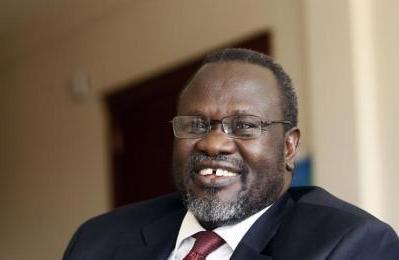South Sudanese rebels react to revocation of dismissal of SPLM leaders
June 3, 2015 (ADDIS ABABA) – The South Sudanese armed opposition faction of the ruling (SPLM) party has welcomed the decision to revoke the “unconstitutional” dismissal of their leader, Riek Machar, and his colleagues from the ruling party, saying the move was an “overdue” good gesture in complementing the Addis Ababa peace process.

The rebels commended the decision as correct one but added that this was not the end of the story as many other processes and decisions were still pending in order to end the crisis in the country.
“Well, we welcome the good gesture. It does not come out of the blue. Actually it is overdue because it is a provision in the roadmap agreement on SPLM reunification process signed in Arusha several months ago,” Machar’s spokesman, James Gatdet Dak, told Sudan Tribune on Wednesday evening when contacted for comment.
“President Kiir who was responsible for this unconstitutional dismissal of senior party leaders was directed by the roadmap agreement to unconditionally revoke his decision,” he added.
Dak pointed out that the revocation of the dismissal decree was meant to smoothen further steps in the tripartite intraparty dialogue in order to further negotiate within the party and reach an agreement on reforms in structural, organizational and future party leadership matters.
He blamed president Kiir’s group for aborting internal party transformation processes which sparked the violence and had now developed into a national crisis beyond the party.
Even from the onset of the crisis in December 2013, he recalled that the opposition leader Machar immediately composed a team of SPLM leaders from his side in January 2014 to meet with president Kiir’s SPLM team in Addis Ababa so that the crisis would have been arrested at the party level, adding Machar’s idea was rejected and the “conflict has now developed into a national crisis.”
He however said the particular decision to revoke dismissal would be complementary to the Addis Ababa peace process led by the Intergovernmental Authority on Development (IGAD), particularly on the executive power-sharing for government during a transitional period.
“Let us wait and see how this reinstatement to previous party leadership positions will reflect on the government’s position in regard to leadership structure and executive power-sharing in a transitional government of national unity,” he further added.
He challenged that the government was opposed to IGAD proposed executive power-sharing which would see the rebel leader, Riek Machar, become either a prime minister or first vice president with shared executive powers.
The rebel leader’s spokesman however said the intraparty dialogue did not confirm president Kiir to continue as the party chairman, stressing that there were pending processes on mechanisms within the dialogue that would address party leadership in the course of reunification.
He said this would be like restarting from square one from where we left in December 2013 when president Kiir violently interrupted the processes of party transformation, reforms and leadership contest.
On government leadership, he also said president Kiir has become illegitimate president either through expiry of his term limit or by his deeds which caused the war and administered massacre of thousands of civilians in the capital, Juba.
“These are some of the issues the warring parties shall be tackling in the two complementary processes in Arusha or in Addis Ababa,” he said.
He however commended partial implementation of the Arusha roadmap agreement in order to help expedite the Addis Ababa process, but ruled out possibility that the rebel leader would return to Juba as first deputy chairman of the SPLM per party agreement without a comprehensive peace agreement in Addis Ababa.
(ST)
